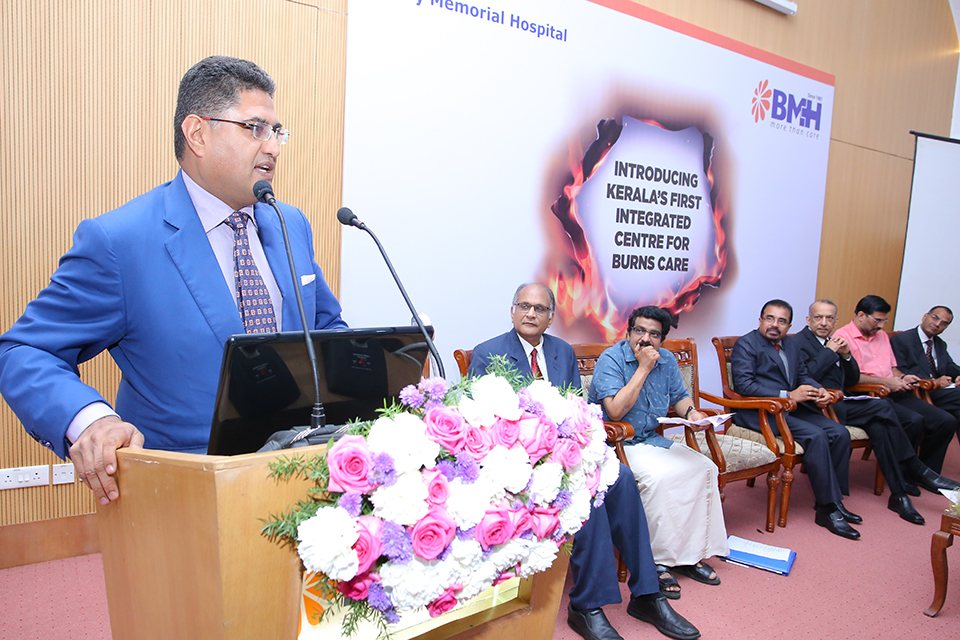UK to focus on providing support to burn victims
Remarks by British Deputy High Commissioner Chennai Bharat Joshi at inauguration of the integrated Burn-Care Centre in Kerala, 23 November.

Welcome and thank to you all, dignitaries and guests.
I’m pleased that my first visit to Kozhikode is for such a worthwhile event. Chairman, many thanks for your hospitality and warm welcome.
As Rudy said, across India we have committed time, energy and money to help tackle violence against women (VAW).
Last year we funded a project to develop the capacity of the legal system to support victims of sexual and domestic violence in Kerala and Tamil Nadu.
This year, we are focusing that VAW-related effort on a neglected theme: burns across even more states. It’s hard – even invidious – to try to categorise which forms of violence are worse. But I know from my many years in Africa that the impact of burns is different. Burns are – often horrifically - visible. They’re permanent. They mark victims out from the rest of society. And among survivors, a woman’s vulnerabilities are unique because of the psycho-social stigma they face – as women - from family, friends and employers.
Access to justice and tackling impunity are pillars of the UK government’s work globally to strengthen democratic governance and rule of law. Globally, not just in India, women often fail to report violence because of fear of evidence gaps, delay in due process.
It’s no accident that this initiative started in Chennai. Tamil Nadu has a unique public-private-civil society collaboration which has developed over many years and could be a model for other Indian states. Chennai-based PCVC, who work to prevent and tackle VAW, found that women survivors need not just specialist medical care but equally vital post-medical care in the form of continued psycho-social support. And without that model, survivors can fall back into a cycle of violence or commit suicide out of sheer desperation. So they have worked closely with the hospital burns units, police, lawyers, psycho-social workers, potential employers to ensure that survivors received holistic support.
This new initiative will achieve four key outcomes:
Firstly, it will build on our current understanding of burns incidence, reporting, recording and medical and post-medical management. This will help inform us of trends, scale, complexity that can in turn influence state and central-level policy and practice.
Secondly, it will facilitate regional-level discussion in four target states – Tamil Nadu, Telangana, Maharashtra and New Delhi. These are planned over the coming weeks and months and will bring together public and private sector institutions who are involved in burns support including health professionals, NGOs supporting VAW victims, police managing cases involving burns, state health & social welfare officials. We hope that this will encourage others states to initiate similar discussion.
Thirdly, it will collate this learning for a National Roundtable in Delhi next year, in the form of concrete recommendations that could transform the experience of these women survivors.
Finally, it will produce a new handbook that will guide grassroots practitioners so that women burn survivors benefit from more holistic, integrated support.
Rudy referred to Baby Memorial Hospital’s (BMH) commitment to offering not just general healthcare but also to offering the widest possible range of dedicated intensive burn-care. There’s a difference between merely having a team of plastic and reconstructive surgeons and related support staff on call and actually providing them with dedicated infection-sensitive infrastructure. BMH’s Burns ICU offers just that. This sort of exclusive facility makes a huge difference to survivor outcomes – reducing pain, quickly checking and reducing the chance of further infection, reducing the need for further surgeries, speeding up recovery and ensuring a more supportive, more caring environment for burn survivors.
India needs more facilities like this one. I can’t think of a better place from which to launch this transformational project.
Thank you.